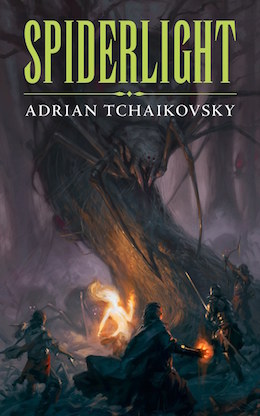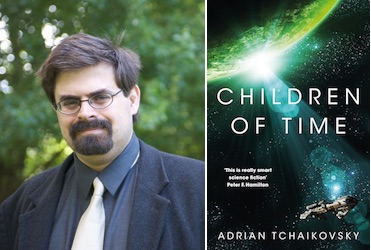With the undeniable theme of arachnids underpinning his body of work—from a band of misfits attempting to steal the merciless Spider Queen’s treasure to an entire planet of highly evolved spiders—Redditors had to know: Is Adrian Tchaikovsky secretly really one giant spider in a human suit or thousands of smaller spiders in a human suit? Readers can rest assured, because the Clarke Award-winning author responded, “We prefer to use a holographic disguise, it’s less restrictive.”
…That ominous answer aside, the spider-averse should give Tchaikovsky’s AMA (Ask Me Anything) thread in Reddit’s r/fantasy a read, as it is equal parts clever and creepifyin’. We’ve compiled the highlights, which include the authenticity of the nightmare-inducing science in Children of Time, the inspiration for his Tor.com Publishing novella Spiderlight, and conversations about when to kill off characters and the existence of everyday magic, inspired by his epic fantasy series Shadows of the Apt. And who knows, it might actually win you over to picking up one of the spider-centric tales that Tchaikovsky has woven.
First off, the obvious question:
LauraMHughes: What’s your favourite type of spider? And why?
ZiGraves: I have a sneaking suspicion, following Children of Time, that it’s jumping spiders.
AT: Well yes—ask me before I started on CoT and I would probably have ranged around a bit—bird-eaters, funnel-webs (because my God they look nasty!), even Recluses (because of the supposed weird-ass venom they pack, though apparently that may be entirely an urban myth). Then I discovered unassuming little Portia Labiata and my heart was lost forever. I’ve always been fascinated by all kinds of non-human intelligence—the less human the better. Invertebrates that demonstrate apparent problem solving abilities, like Octopodes (-topi/-topuses? Have completely lost track of what the proper one is now, after QI) and mantis shrimps utterly fascinate me. And then along comes this miniscule arachnid with object permanence and complex spatial memory, and the ability to adapt and experiment. I got an entire book out of that one discovery.
 Much of the AMA revolved around Children of Time, which picked up the Arthur C. Clarke Award last month—likely because many readers had the experience of Redditor cp_trixie, in pushing past deep-seated arachnophobia in order to appreciate Tchaikovsky’s larger commentary about generation ships and humans landing on planets already inhabited by other races. Conversation included inspiration for other stories like Spiderlight, how Tchaikovsky approaches the science of his ideas, and a potential hint toward future arachnid adventures…
Much of the AMA revolved around Children of Time, which picked up the Arthur C. Clarke Award last month—likely because many readers had the experience of Redditor cp_trixie, in pushing past deep-seated arachnophobia in order to appreciate Tchaikovsky’s larger commentary about generation ships and humans landing on planets already inhabited by other races. Conversation included inspiration for other stories like Spiderlight, how Tchaikovsky approaches the science of his ideas, and a potential hint toward future arachnid adventures…
yourfavoritequote: What do you love most about writing and how do you get your ideas? Is it that you dreamt something or very active imagination? Well imagination is required in writing but still.
AT: I tend to bounce off other things I read, or stock genre tropes (cf. Spiderlight especially), or I find a particular world idea that I want to explore—I generally start with the world & let the characters and plot develop organically from that. Children of Time came out of the genuine capabilities of the spider species involved, because they’re so remarkable they were just begging for a bit of forced evolution…
badpenny1983: How important was it that the spiders evolve in a realistic way and how did you go about researching what they might be capable of doing?
AT: I am very conscientious about the science in my science fiction, which essentially translates as “my ideal audience knows slightly less about any given area of science than I do, and therefore won’t trip me up on it”—because unknown unknowns, of course. I did want the spiders, especially, to have a solid factual basis, because that’s the book’s central conceit, and if it didn’t come across as plausible to the readers then probably the whole book would sink. I had a certain amount of knowledge in the area, both modern arthropods, and the giant invertebrate fauna of the Carboniferous and Permian, and I took that to Dr Barclay who heads the Natural History Museum’s entomology department and spent the day talking over various ramifications with his team and picking up useful snippets (the whole Paussid beetle plot comes from there, along with the way the Portiids moult). As per the acknowledgements, I owe them a great deal in making the weird-ass idea into something reasoned and palatable.
cp_trixie: Currently reading Children of Time (about 20% through or so?) and while I like spiders and all this is completely pushing the limits of what I can read before bed. So, no question.. just wanted to say that if I can make it through this spiderfest I will totally check out some of your other stuff because despite all the creepy crawliness I am really enjoying it.
Spiders.
AT: I consider CoT to be an outreach program for literate-minded arachnophobics :) There has been a pleasant number of readers who really don’t like spiders but (a) have got through the book; and (b) have come out of it willing to give the little guys the benefit of the doubt. Of course now I need to stealth-write a book that has spiders as utterly horrible people-destroying bad guys just to utterly throw my readership…
Contrasted with the science question above, consider this great exchange about everyday magic:
dog_solitude: I liked that in Shadows of the Apt there was clearly commonplace ‘kinden’ magic (flying etc) but lots of them scoffed at the other form of magic, even though they were surrounded by everyday magic. In real-life, what do you think could be magic that we just don’t realise as it’s everyday and commonplace? (My idea is that consciousness would fit this bill—matter can think! We have no idea how it works but everyone accepts it.)
AT: As far as magic goes, I spent most of my youth desperately trying to believe in all kinds of Mysteries of the Unexplained kind of stuff. I have become more and more a rationalist as I’ve aged, calloused over by all those little disappointments when you find that the “mysteries” those library books were so mysterious about generally have not only explanations, but well-known and explicit explanations that the mystery books were effectively hushing up to sell copy. I think the closest sort of thing to what you’re describing is going to something at the basal level of physics – we’ll discover what dark matter or dark energy is, and suddenly everything we knew about the universe will change (again) and things we thought were just plodding along doing their fairly dull thing will become alive with possibilities.
Shadows of the Apt fans will appreciate the conversations around the series (which ended in 2014 with its tenth book), from macro worldbuilding to micro relationship arcs and Tchaikovsky’s thoughts on when to kill off characters:
InCatMorph: I’d be interested in hearing a little more about your world-building, especially as to how you use real-life history. What’s your process for researching history and incorporating it into your worlds?
And was there anything in particular that inspired Stenwold’s character? (I’m a historian, so I love historians who do remarkable things.)
AT: With SotA I ended up with two very different ends of real history to play with—the basic political setup was inspired by the classical world—so the Lowlands owes something to Greek city-states, the Empire is the rising power of Macedonia, the Spiderlands is Persia etc—although the comparison frays at the edges if you pull at it too much. However the actual plot accelerates into 20th century territory fairly quickly—I wanted to have my insect-kinden artificers face the same kind of technological challenges as real world engineers, but solve them using their own very different technology (a trick I would go back to with Children of Time)—hence when they’re dealing with the air raids in Air War they have no radar, but they invent a “great ear” that picks up the enemy engine noise, & so forth. I tend to refer to this sort of malarky as “echo history” because it’s too far from the real to be “alternate” but it still kind of scuttles along in parallel.
Sten’s speeches in Empire are strongly influenced by Churchill’s from before/around WWII. He isn’t necessarily Churchill in every way, but he has some of the same qualities (good and bad) as a statesman.
HighlandUK: When writing a long series (shadow of the Apt), how do you deal with the problem of killing off major characters/keeping their arc interesting? I always wanted Thalric and Cheerwell to have a happy ending, but was convinced that Thalric was going to die in every book I read.
AT: Y’know, after you get so far into a serious, killing off major characters ceases to be a problem and becomes something you actively look forward to… Seriously, though—I tend to find that the books know when the characters’ time to die arrives, and that overrides my own plot and preferences. At the end of Salute the Dark, there was one main character who should have survived, but died, and a villain who escaped death by the skin of his teeth (and the cogs of his artificial arm). I am also a firm believer in heroes having to ‘earn’ their victory, and often the currency they have to pay in is blood.
this_chucklehead: so, I am currently on book 10 of shadows of the apt with that and the short stories to read and was wondering if you had considered taking the shadows of the apt universe to a graphic novel format? Maybe looking at stores from the “bad old days”
AT: Oh lord, I’d love to do/see a SotA graphic novel, should the opportunity ever arise. I actually have a completed graphic story—art by the very talented Astrom Chang, and am currently trying to find a place for it. Comics has proven a tough gig to break into so far, but it’s one of my ambitions, and ideally that would lead to a SotA series. As far as stories from the Bad Old Days/Days of Lore, people keep asking, and I am kind of tempted, but I would need a strong story idea that wasn’t in itself about the revolution – because otherwise I’d run into the standard prequel problem of “you know what’s going to happen already”.
Paying it forward:
DeleriumTrigger: Adrian, you’re one of the more interesting guys I’ve read about. You’ve more than made compelling pitches for your own books—can you make a compelling pitch for me to read another author’s works whom you’re a fan of?
AT: I am going to pitch Emma Newman at you, in that case. She writes some of the best ever urban fantasy in her Split Worlds series, which is head and shoulders above the usual, involves social critique, multiple worlds, horrible politics and some completely batsh*t crazy wizards—and then she brought out Planetfall which is one of the most sublime SF novels I’ve read—a colony ship arrives on a distant planet guided by a religious fanatic, and finds a huge, utterly alien structure and an otherwise barren world. Years on, the fanatic has vanished/ascended and her closest friend has a whole lot of problems she’s hiding. It’s a really fascinating read and the narrator is the sort of elegant character study I’d love to be able to write.










